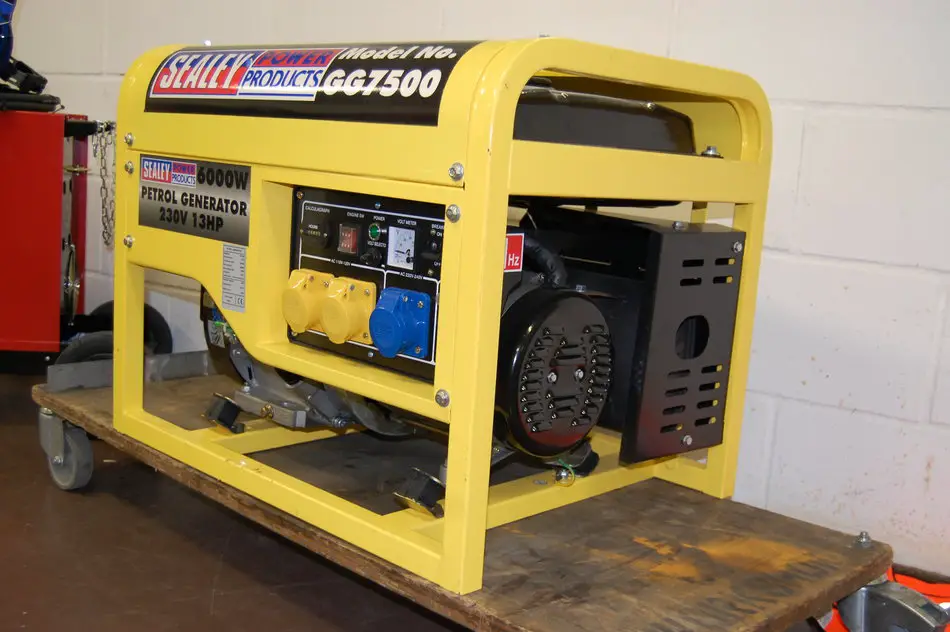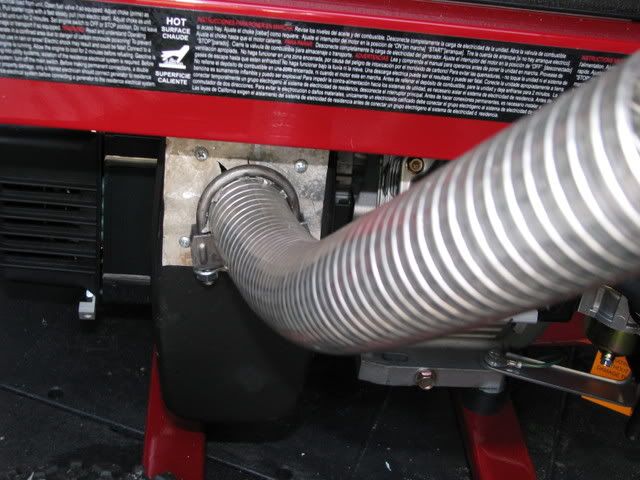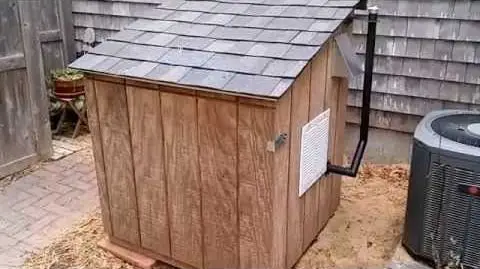
Perhaps it’s raining, and you can’t run the generator outside, or maybe you want to run your generator indoors due to security reasons. Whatever the reason, a lot of homeowners who live in states where there are constant power outages have been asking this question for years. In this article, you will learn whether or not it’s a good idea to run a generator in your garage.
Running a generator in your garage is a bad idea. That’s because the carbon monoxide produced by the generator is very hazardous to health. However, to safely run a generator in the garage, you have to make an exhaust extension tube for the generator and route it to a well-ventilated area outside your home.
We will take a look at why you should not run your generator in the garage, some workarounds for homeowners who still want to, although not recommended, as well as some general generator safety tips, and best places to run your generator. Let’s get into it.
Reasons why you should not run a generator in the garage
A lot of homeowners have been tempted to run their generators indoors. Although we inherently know it’s not a good idea, we try to find some workarounds or look for approval and tips online from people who have successfully run a generator in their garage.
However, here are some compelling reasons why you shouldn’t run a generator in the garage, or anywhere in the house.
1. Carbon Monoxide Poisoning
Generators emit the same fumes as that of our vehicles. It’s safe to park our cars in the garage, the carbon monoxide produced by a car is at low levels. Besides, the emission stops after a short while.
Generators are known to emit very high levels of carbon monoxide. According to the National Institute of Standards and Technology, a single generator can produce the same carbon monoxide as 100 cars. That is an alarming statistic. And what is worse, a generator is usually run continuously for hours until the grid power is restored. Just imagine the amount of carbon monoxide a generator will emit in 5 hours of a power outage.
Having all this carbon monoxide in your home puts your family at risk. With this amount of fumes being produced in the garage, it will take no time before it seeps into the living area and your beloved family’s bedrooms. It doesn’t matter how well-sealed the wall between the garage and the living area is, this poisonous gas will find its way inside your home.
You certainly don’t want to put your family in a health risk. There have been several reports of homeowners losing their lives due to carbon monoxide poisoning. Others are seriously ill for the same reason.
For these reasons, I will not recommend running your generator in the garage, no matter the circumstance you may be in.
2. Noise
Noise is also a reason why I wouldn’t want to run a generator in my garage. It’s no news that generators are one of the noisiest producers of electricity. Having such a noise coming from my garage will make me very uncomfortable in the house.
Perhaps the plan was to start the generator so that you can still use your home’s cooling and heating systems; else, you can’t sleep. That problem will be solved when the generator is operating. However, the noise from the generator might prevent you from sleeping.
Noise will not be an issue for homeowners with insulated garage walls and doors, but even that won’t eliminate the generator’s buzzing noise.
3. Heat
Generators also produce a lot of heat. So having it in an enclosed space such as your garage can lead to problems. Most garages are not well ventilated. There are usually no vents or windows in the garage. Even if they do have windows, they barely get opened by the homeowners. That’s because they risk being invaded by thieves.
Also: Are Garage Vents Required? Everything you need to know
For this reason, the garage can get very hot and uncomfortable to enter, and then the generator can overheat without proper ventilation. So you stand a risk of damaging your generator running it in the garage.
Too much heat in the garage can also be a potential danger to your home. It can easily lead to a fire outbreak. That’s because we have all these items which can easily catch fire stored inside the garage.
Workarounds: Ways to Safely Run a Generator in a Garage
It is not safe running a generator in the garage. I think that point has been made clear so far in this post. However, there are situations where you don’t really have a choice. So here are some recommended ways you can safely run a generator in a garage.
Make an exhaust extension for your generator.

The best option you have is installing an exhaust extension for your generator if you really want to run your generator in the garage. With an exhaust extension installed, all the fumes from the generator can be routed to a safe, well-ventilated area outside your home.
It’s important to make sure the generator’s exhaust is correctly sealed by the extension tube, and there are no leakages. Also, the extension tube has to be as far away from your home as possible. A good length for the tube is at least 15 feet away from your home.
Alternatively, you can route it through a plumbing vent to the roof. Ensure the plumbing is securely covered to prevent rainwater from entering the generator’s exhaust.
I have a step by step guide on how to vent your generator so you can safely run it in the garage. I recommend you check it out. Read it here.
Open your garage door and windows.
Another option when you want to run the generator in your garage is to open your garage door and windows. To prevent fumes from building up in the garage, you have to give the garage as much ventilation as possible. Opening up the garage door and windows will allow natural air to exchange the toxic fumes from the generator.
To improve airflow in the garage, I recommend you install an exhaust fan. This will help suck all of the fumes from the garage much faster than natural ventilation would.
This is not the best option to go for. That’s because the fumes can still get into your home, even when they escape the garage through the windows and garage door. Also, you expose your home to thieves. They can simply enter the garage with your door wide open, pick anything they want, and skedaddle.
However, if you are not going to run the generator for a long time, you can get away with this.
Can I run a generator in a detached garage?
Generally, it’s not recommended to run a generator in an enclosed space, and that includes your detached garage. That’s because carbon monoxide will build up in the place, making it unsafe to enter.
The only advantage a detached garage has over an attached garage is, it is relatively safer to run a generator inside. That’s because the chances of carbon monoxide seeping into your home are very low. However, all safety precautions apply, whether the garage is detached or not.
You have to install an exhaust extension for your generator and route it through a vent pipe, just as we have discussed earlier. This will prevent carbon monoxide buildup in the garage.
Also, the detached garage should be well ventilated. This way, any residual fumes from the generator will be blown away by natural ventilation.
Alternative locations to place your generator
Although the workarounds may work, it’s still not an ideal situation to run your generator. If the weather condition is not favorable to run a generator outside, here are some alternative ways to place the generator away from your home.
Place the generator in a waterproof dog house.
This is an excellent way to still run your generator outdoors, even when it’s raining or snowing. A waterproof dog house will protect your generator from the elements and keep it safe.
Lucky Dog’s Pet Outdoor House (on Amazon) is a perfect example. It has waterproof roofing to protect your generator from the rain or snow. The body is, however, made with a wire mesh. This gives your generator the necessary ventilation to emit fumes. It’s also spacious enough to fit your portable generator.
A4Pet Outdoor Wooden Dog House (also on Amazon) is also a great option for homeowners who prefer the full protection of their generators. The body of this dog house is made of wood, with a door-shaped opening for your pet. The roof of this dog house can be detached. That is how you can fit your generator inside.
Place the generator at least 20 feet away from your house, and make sure your generator’s extension cord is in good condition.
Build a woodshed for the generator

If you are an avid DIY’er, this can be a fun project to do during the weekend with the family. Building a well ventilated and spacious woodshed for the generator will help keep it secure. Also, it will help protect your generator from damage.
Suppose you are not excellent at DIY, no problem. A dog house will work just as well.
Generator Safety and Security Tips
Here are some general generator safety and security tips to keep you and your family safe, and to protect your property
- Place your generator at least 20 feet away from your house
- The direction of the exhaust should be pointed away from your house
- Place generators in a dry place to avoid electrocution
- Place your generator in a well-ventilated area to keep it cool
- To improve your family’s safety, install a battery-powered carbon monoxide sensor in every room. This will help detect any carbon monoxide traces in your living space
- Always lock your generator to a permanent structure when you place it outside to prevent generator theft
Conclusion
Running a generator in your garage will put you and your family at risk by exposing you to high carbon monoxide levels. I highly recommend you don’t do that. However, you can safely run it in the garage by routing the fumes to a well ventilated with an exhaust extension tube.

